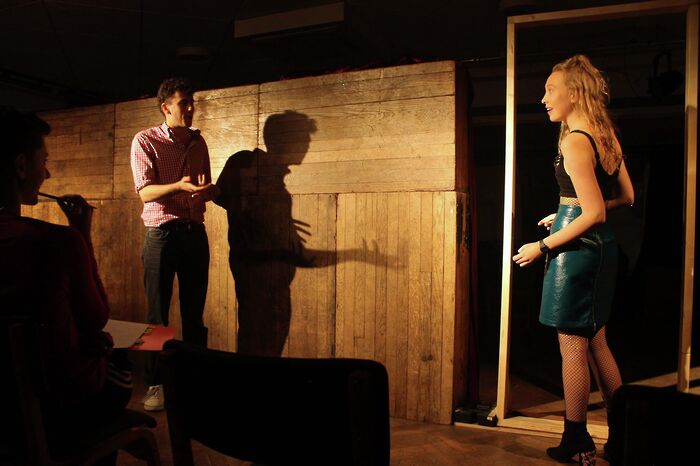King Charles III review
This production of a future history play is highly engaging and gets a lot of things very, very right

Mike Bartlett’s King Charles III is a work of future history that portrays the current Prince Charles’ ascension to the throne after the death of Queen Elizabeth. It pays homage to Shakespeare’s histories, written entirely in blank verse and peppered with allusions to his most famous lines. The play centres on a constitutional crisis precipitated by the new king’s attempt to withhold royal assent from a bill he regards as undermining freedom of speech.
Director Issy Snape does a marvellous job bringing the production together, getting some things very, very right. This show stands out from the crowd by not only having well-designed set, lighting, and sound, but also by having these sometimes-disparate elements of a production work together to create effects that are larger than the sum of their parts.
The main piece of the set is well-chosen: a raised velvet platform that is very suited to all the scenes in palace rooms and great halls of state, and even manages to add character to the one scene in a nightclub. The backdrop looks solid normally, but, through a trick of lighting, becomes obviously see-through when Diana’s ghost (wouldn’t be a faux-Shakespeare play without a ghost, would it?) appears behind it, creating a very eerie feeling. Fixed to the backdrop is the outline of a map created using electrical wiring that double as flashing lights, which come on during the more energetic transitions and scenes, and with what look like pieces of silver cellophane not quite filling out the map, alluding to the disintegration of the polity.
I found it remarkably creative that so many elements of the set did double or triple duty without prejudice to the effects they were intended to create. (The person who noticed that velvet becomes both palaces and nightclubs has a new fan in me.) I was also very impressed by the economy of the set and lights in terms of how they managed to do such varied things with these individually simple elements. Along these lines, it would be unfair not to recognise the sound design as well: music accompanies many scenes, but never drowns them out, and is always appropriately chosen, from slow-moving, dramatic pieces in tense scenes to a horror-movie-esque soundtrack for Diana’s appearances.
"The person who noticed that velvet becomes both palaces and nightclubs has a new fan in me"
Snape’s attention to detail is also evident elsewhere. She often plays with levels to emphasise power differentials, an obvious recurring theme for a political play. The scene that opens the second half of the play is ridiculously well-thought-out: although the first half has mostly shown characters in formal attire, we shift abruptly to protesters in hoodies and Guy Fawkes masks demonstrating against the king. The sartorial contrast grabs your attention; what holds it is the excellent choreography, with everyone marching in unison and making effective use of rhythm to give a sense of the disruptive energy that now rends Britain. The protesters even have funny signs (which I won’t spoil), like you’d expect to see in real life.
The efforts of the creative team are complemented by a talented cast, who put in compelling performances across the board. Ferdinand Holley’s portrayal of Charles is particularly notable for his convincing portrayal of a man advanced in age, limping as he walks, sometimes slowed in speech, but still determined that he can do what he sets his mind to. Since student theatre naturally tends towards plays with young characters, it’s refreshing to see an older protagonist for once, and even better to see it done well.
My only reservation about this production was that the final scenes were unfortunately not as good as they could have been. For example, I wasn’t convinced by the way Charles seemed to suddenly give in after strong resistance throughout the play, and I thought there was scope for the final confrontation to be even more dramatic and moving. On the whole, however, that’s just more room for this excellent production to get even better over the next few days.
On the whole, King Charles III is entertaining, highly engaging, and vey well put together. I left the theatre impressed, and on reflection am even more so.
 News / Downing investigates ‘mysterious’ underground burial vault 29 December 2025
News / Downing investigates ‘mysterious’ underground burial vault 29 December 2025 News / Unions protest handling of redundancies at Epidemiology Unit30 December 2025
News / Unions protest handling of redundancies at Epidemiology Unit30 December 2025 Lifestyle / Ask Auntie Alice29 December 2025
Lifestyle / Ask Auntie Alice29 December 2025 Features / ‘Treated like we’re incompetent’: ents officers on college micromanagement30 December 2025
Features / ‘Treated like we’re incompetent’: ents officers on college micromanagement30 December 2025 Science / Astronomical events to look out for over the break29 December 2025
Science / Astronomical events to look out for over the break29 December 2025










